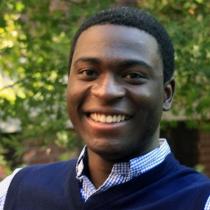
Derrick Brown
After graduation, what's your next adventure?
I’m going to move to St. Louis to join the Boeing Company as a configuration design engineer. I will drive there on December 19 to look at property, but Boeing’s taking care of the moving van and putting me up while I look for a place. They’ve even gotten me a realtor.
What about your next adventure are you most excited about?
Mostly I’m looking forward to the opportunity to gain industry experience. Being a transfer student, I wasn’t able to get fully immersed in all of the hands-on research and other activities that other Tech students do. When I join Boeing, I’ll be able to get some more of that experience – creating a wind tunnel and running a wind tunnel test, doing some propulsion integration testing. Also, I come from a military family, and I know the Boeing project will be in the area of defense. That’ll put me in the front end of the technology that will be leading the military.
Did you have any previous co-op internship or research experience that helped you get to this point?
Since transferring here two years ago, I have had two internships with Boeing in St. Louis. My first one – summer of 2015 – I was an aerodynamics and propulsion engineer. I played a support role in the production process, which was great for the experience, but not what I want to do. The thing is, the whole experience was a door-opener. It gave me the opportunity to prove myself, to prove that I could work hard on a project and deliver. After I did that, I had more confidence in myself, so I asked to be placed into an internship that focused on my interests, which are in advanced design. That’s exactly where I landed in the summer of 2016. I was asked to design an aircraft that could replace the 810 WartHog. That was great. I got to do 3D modeling in X, a software modeling program.
How did your educational experience at Georgia Tech help you achieve your goal?
I gained a lot of knowledge here, but it’s the intuition that will help me excel a Boeing or anywhere I’d go. As a configuration design engineer, I had to be a jack-of-all-trades. I had to know something about structural analysis, aerodynamics, propulsion – things I learned at Georgia Tech. I had to know how to take those things out of the box and use them on the job. And my experience at Georgia Tech supported that all the way.
What advice would you give a student who was thinking about following your steps at Georgia Tech's aerospace engineering school?
Success starts with hard work. But it doesn’t end there. A lot of people are extremely intelligent, getting 4.0 GPAs for their work in classes. That takes hard work, and some talent, certainly, but what sets successful Tech grads apart is our willingness to innovate. By that, I mean you’ve got to know your material well enough to think outside the box, to put in the grind when the solution doesn’t jump out at you. I’ve talked to engineers in advanced design, and they tell me that the ‘human computer’ types – the ones who can run calculations in their heads – are great, but when it comes to solving problems, they need people who know their stuff well enough to step back, look at the big picture, and find an innovative solution. So, yeah, work hard because you’ll have to. But remember to step back and think about what you are doing, because that’s where you’ll find success